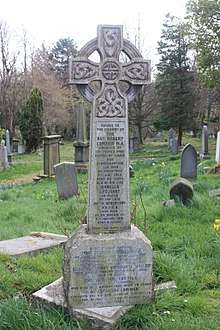Hilda Lorimer
Elizabeth Hilda Lockhart Lorimer (30 May 1873 – 1 March 1954) was a British classical scholar who spent her career at Oxford University. Her best known work was in the field of Homeric archaeology and ancient Greece, but she also visited and published on Turkey, Albania and the area that later became Yugoslavia. She took the position of vice-principal of Somerville College during the Second World War.
Hilda Lorimer | |
|---|---|
 | |
| Born | Elizabeth Hilda Lockhart Lorimer 30 May 1873 Edinburgh, Scotland |
| Died | 1 March 1954 (aged 80) |
| Nationality | Scottish |
| Citizenship | United Kingdom |
| Academic background | |
| Education | High School of Dundee |
| Alma mater | Girton College, Cambridge |
| Academic work | |
| Discipline | Classics |
| Sub-discipline | |
| Institutions | Somerville College, Oxford |
Family

Lorimer was born on 30 May 1873 in Edinburgh, Scotland.[1] She was the second of eight children born to Reverend Robert Lorimer and his wife. Her brother David Lockhart Robertson Lorimer was a lieutenant-colonel in the British Indian Army, a linguist and a political official in the British Indian government.[2][3] Her brothers Gordon and Bert worked in the civil administration in the Indian Political Service.[4] Another, William, became Professor of Classics at St Andrews. Her sister Emilia became a notable poet, and her other sister Florence served as personal secretary to Aurel Stein at the British Museum. It was said that she could speak ancient Greek and Latin by the age of five.[5]
She never used her first name;[6] her family called her Hiddo; and at Oxford she came to be known as Highland Hilda because of her Scottish background.[1]
Education
Lorimer attended the High School of Dundee in Scotland from 1889 – 1893. She was granted a scholarship to Girton College at Cambridge University, where she earned a first.
Career
In 1896, she became a fellow and tutor of Classics at Somerville College, Oxford, which is where she spent the rest of her career. At Somerville, she had little contact with colleagues.
She was a skilled Latin linguist, but at Oxford her interests turned toward archaeology. She took a sabbatical to attend the British School at Athens in 1901 and 1902. There she began focusing on Homeric archaeology, the study of ancient civilisations known through the poems of Homer.[7] In 1911, she participated in excavations at Phylakopi on Melos. Dorothy Lamb, Lillian Tenant and Lorimer were the first women to participate in an excavation conducted by the British School at Athens.[8] The excavation, led by Richard MacGillivray Dawkins, the director of the British School, was conducted from March to May 1911. The project was a supplementary excavation of a site that had been explored from 1896 to 1899.[9]
In 1917 she went to Salonica as a nursing orderly in the Scottish Women's Hospital (the Girton and Newnham Unit).[10]
Lorimer took an Oxford MA at the first opportunity, in 1920,[11] and a Cambridge MA in 1948. She returned to Athens in 1922 and became a university lecturer at Oxford from 1929 to 1937. She retired in 1939, but remained an honorary fellow. She took the position of vice-principal of Somerville College during the second world war.[5]
She died on 1 March 1954 and is buried with her siblings in Warriston Cemetery in north Edinburgh. The grave lies to the south-west of the now-sealed eastern entrance.
Publications
Lorimer published extensively on Homeric studies throughout her career, but her seminal work came late in life with the publication of Homer and the Monuments. Its publication was delayed until 1950 by the Second World War.
References
- Waterhouse, Helen (23 September 2004). "Article Lorimer, (Elizabeth) Hilda Lockhart (1873–1954), classical scholar". Oxford Dictionary of National Biography. Oxford University Press. doi:10.1093/ref:odnb/48498. Missing or empty
|url=(help) - Emily Overend Lorimer, "Papers of Emily Overend Lorimer, author, editor of 'Basrah Times' 1916–17, wife of Lt-Col David Lorimer, Indian Political Service 1903–27 Mss Eur F177 1902–1949", British Library, Asia, Pacific and Africa Collections; Private Papers [Mss Eur F175 – Mss Eur F199], National Archives (UK)
- Lorimer, Lieutenant-Colonel David Lockhart Robertson, School of Oriental and African Studies (SOAS) Archive Catalogue
- Penelope Tuson (19 December 2003). Playing the Game: Western Women in Arabia. I.B.Tauris. pp. 2–. ISBN 978-1-86064-933-2. Retrieved 23 May 2013.
- "Brunei Gallery at SOAS: Bakhtiari Kuch - Early European Travellers: Caricature Orientalists or just Men of their Time?". www.soas.ac.uk. Retrieved 8 December 2019.
- Waterhouse, Helen. "Hilda Lorimer" (PDF). Breaking Ground by Brown.edu. Retrieved 7 December 2019.
- Helen Waterhouse, Breaking Ground: Women in Old World Archaeology, Brown University.
- Hamilton, Sue; Whitehouse, Ruth D.; Wright, Katherine I. (2007). Archeology and Women: Ancient and Modern Issues (2nd ed.). London: Routledge. pp. 55–56. ISBN 1-59874-223-X.
- Dawkins, Richard; Droop, J.P. Excavations at Phylakopi in Melos, 1911. The Annual of the British School at Athens, Volume 17. Athens: British School at Athens. pp. 2–3.
- "Somervillians in the First World War". blogs.some.ox.ac.uk. Retrieved 5 May 2018.
- "Degrees conferred at Oxford". Yorkshire Post, 15 October 1920. p5.